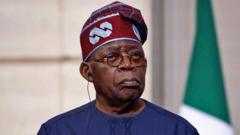
Appointments Spark Debate Over Regional Representation in Government
Concerns Raised as Key Positions Filled Predominantly by Yoruba Individuals
Abuja, Nigeria - Recent appointments to several high-ranking government positions have ignited a national debate regarding the equitable distribution of power and representation across Nigeria's diverse ethnic groups. The appointments, overseen by the current administration, have resulted in a significant number of Yoruba individuals being placed in key roles, leading to accusations of favoritism and undermining the principle of federal character.
The principle of federal character, enshrined in the Nigerian constitution, mandates that appointments to public service institutions reflect the country's diverse ethnic and geographical composition. This principle aims to prevent any single group from dominating government and to foster a sense of national unity and inclusivity.
Details of the Appointments
The controversy stems from the recent selection of individuals to fill vacancies in prominent positions within various government agencies. These include, but are not limited to:
- The Director-General of the National Petroleum Regulatory Commission (NPRC)
- The Chief of Staff to the President
- The Comptroller-General of the Nigerian Customs Service
- Several key advisory positions within the Presidency
While the individuals appointed are undeniably qualified professionals, critics argue that the concentration of Yoruba individuals in these positions raises legitimate concerns about regional bias and the potential for marginalization of other ethnic groups.
Arguments For and Against the Appointments
Supporters of the appointments maintain that the individuals were selected based solely on their merit, experience, and competence, regardless of their ethnic background. They emphasize the importance of placing qualified individuals in key positions to ensure effective governance and national development.
However, opponents argue that while merit is undoubtedly important, it should not come at the expense of equitable representation. They contend that the appointments disregard the spirit and letter of the federal character principle, potentially exacerbating existing ethnic tensions and undermining national unity.
Reactions from Political Analysts and Civil Society Organizations
Political analysts have weighed in on the matter, offering diverse perspectives on the potential implications of the appointments. Some argue that the controversy is being deliberately stoked by political opponents seeking to undermine the current administration, while others acknowledge the validity of the concerns raised by critics.
Several civil society organizations have issued statements condemning the appointments, calling for greater transparency and a commitment to upholding the principles of federal character. They urge the government to take steps to address the concerns raised and ensure that future appointments reflect the diversity of the Nigerian population.
Potential Consequences and the Path Forward
The controversy surrounding these appointments could have several potential consequences, including:
- Increased ethnic tensions and mistrust
- Erosion of public confidence in the government
- Challenges to the legitimacy of government policies and decisions
- Political instability and social unrest
To mitigate these risks, it is crucial for the government to engage in open and constructive dialogue with all stakeholders, including political parties, civil society organizations, and representatives of various ethnic groups. Furthermore, the government should:
- Conduct a comprehensive review of the appointment process to ensure compliance with the federal character principle.
- Implement measures to promote inclusivity and representation across all levels of government.
- Publicly commit to upholding the principles of fairness, equity, and justice in all government operations.
Addressing these concerns promptly and transparently is essential to maintaining national unity, promoting social cohesion, and ensuring that all Nigerians feel represented and included in the governance of their country.
The situation remains fluid, and further developments are expected in the coming weeks as the government responds to the growing criticism. This is a developing story.
```